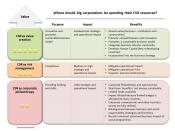Recently the issue of corporate social responsibility has come into the lime light following the collapses of such companies as HIH, One.Tel, and Ansett in Australia; and Enron, and WorldCom in the United States, this coupled with increasing public concern about the immoral actions of companies such as James Hardie and the overall state of corporate governance around the world has prompted the Corporations and Markets Advisory Committee (CAMAC) to review the Corporations Act 2001 (Cth) and see if changes need to be made in respect to directors duties, and the interests taken into account when making corporate decisions, as well as the environmental and social impact of such decisions. The main questions at hand are should the interests of other stakeholders be taken into consideration when such decisions are made or should they only reflect those of the shareholders in the company, to which directors are ultimately responsible.
Other issues that have arisen include the impact of corporate actions on society and the environment at large. However what society and the government should really be asking is, what exactly is corporate social responsibility, to what extent should directors take such issues into consideration and how would such practices be encouraged, implemented and enforced?
To begin with; how would one define corporate social responsibility (CSR), is it merely morals and ethics or is it much more then that, and can companies reflect such values? Firstly a definition of CSR must be determined, and since there is no one definition in use around the highly globalised corporate world, it is necessary to review some of the existing ones and determine what should be used. The World Business Council for sustainable development defines CSR as the continuing commitment by business to behave ethically and contribute to economic development while improving the...


